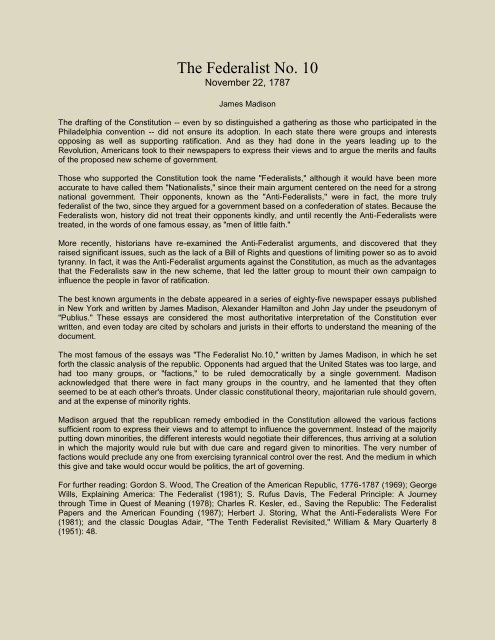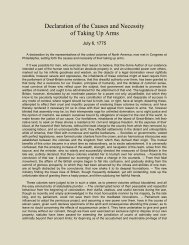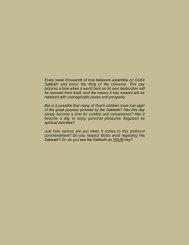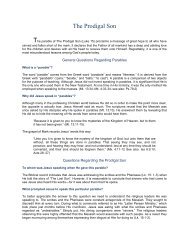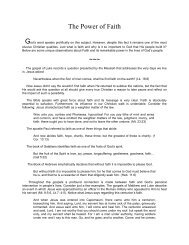The Federalist No. 10 - Blow the Trumpet
The Federalist No. 10 - Blow the Trumpet
The Federalist No. 10 - Blow the Trumpet
You also want an ePaper? Increase the reach of your titles
YUMPU automatically turns print PDFs into web optimized ePapers that Google loves.
majority is included in a faction, <strong>the</strong> form of popular government on <strong>the</strong> o<strong>the</strong>r hand enables it to sacrificeto its ruling passion or interest, both <strong>the</strong> public good and <strong>the</strong> rights of o<strong>the</strong>r citizens. To secure <strong>the</strong> publicgood, and private rights, against <strong>the</strong> danger of such a faction, and at <strong>the</strong> same time to preserve <strong>the</strong> spiritand <strong>the</strong> form of popular government, is <strong>the</strong>n <strong>the</strong> great object to which our enquiries are directed: Let meadd that it is <strong>the</strong> great desideratum, by which alone this form of government can rescued from <strong>the</strong>opprobrium under which it has so long labored, and be recommended to <strong>the</strong> esteem and adoption ofmankind.By what means is this object attainable? Evidently by one of two only. Ei<strong>the</strong>r <strong>the</strong> existence of <strong>the</strong> samepassion or interest in a majority at <strong>the</strong> same time, must be prevented; or <strong>the</strong> majority, having such coexistentpassion or interest, must be rendered, by <strong>the</strong>ir number and local situation, unable to concert andcarry into effect schemes of oppression. If <strong>the</strong> impulse and <strong>the</strong> opportunity be suffered to coincide, wewell know that nei<strong>the</strong>r moral nor religious motives can be relied on as an adequate control. <strong>The</strong>y are notfound to be such on <strong>the</strong> injustice and violence of individuals, and lose <strong>the</strong>ir efficacy in proportion to <strong>the</strong>number combined toge<strong>the</strong>r; that is, in proportion as <strong>the</strong>ir efficacy becomes needful.From this view of <strong>the</strong> subject, it may be concluded, that a pure Democracy, by which I mean, a Society,consisting of a small number of citizens, who assemble and administer <strong>the</strong> Government in person, canadmit of no cure for <strong>the</strong> mischiefs of faction. A common passion or interest will, in almost every case, befelt by a majority of <strong>the</strong> whole; a communication and concert results from <strong>the</strong> form of Government itself;and <strong>the</strong>re is nothing to check <strong>the</strong> inducements to sacrifice <strong>the</strong> weaker party, or an obnoxious individual.Hence it is, that such Democracies have ever been spectacles of turbulence and contention; have everbeen found incompatible with personal security, or <strong>the</strong> rights of property; and have in general been asshort in <strong>the</strong>ir lives, as <strong>the</strong>y have been violent in <strong>the</strong>ir deaths. <strong>The</strong>oretic politicians, who have patronizedthis species of Government, have erroneously supposed, that by reducing mankind to a perfect equality in<strong>the</strong>ir political rights, <strong>the</strong>y would, at <strong>the</strong> same time, be perfectly equalized and assimilated in <strong>the</strong>irpossessions, <strong>the</strong>ir opinions, and <strong>the</strong>ir passions.A Republic, by which I mean a Government in which <strong>the</strong> scheme of representation takes place, opens adifferent prospect, and promises <strong>the</strong> cure for which we are seeking. Let us examine <strong>the</strong> points in which itvaries from pure Democracy, and we shall comprehend both <strong>the</strong> nature of <strong>the</strong> cure, and <strong>the</strong> efficacywhich it must derive from <strong>the</strong> Union.<strong>The</strong> two great points of difference between a Democracy and a Republic are, first, <strong>the</strong> delegation of <strong>the</strong>Government, in <strong>the</strong> latter, to a small number of citizens elected by <strong>the</strong> rest: secondly, <strong>the</strong> greater numberof citizens, and greater sphere of country, over which <strong>the</strong> latter may be extended.<strong>The</strong> effect of <strong>the</strong> first difference is, on <strong>the</strong> one hand to refine and <strong>the</strong> public views, by passing <strong>the</strong>mthrough <strong>the</strong> medium of a chosen body of citizens, whose wisdom may best discern <strong>the</strong> true interest of<strong>the</strong>ir country, and whose patriotism and love of justice, will be least likely to sacrifice it to temporary orpartial considerations. Under such a regulation, it may well happen that <strong>the</strong> public voice pronounced by<strong>the</strong> representatives of <strong>the</strong> people, will be more consonant to <strong>the</strong> public good, than if pronounced by <strong>the</strong>people <strong>the</strong>mselves convened for <strong>the</strong> purpose. On <strong>the</strong> o<strong>the</strong>r hand, <strong>the</strong> effect may be inverted. Men offactious tempers, of local prejudices, or of sinister designs, may by intrigue, by corruption or by o<strong>the</strong>rmeans, first obtain <strong>the</strong> suffrages, and <strong>the</strong>n betray <strong>the</strong> interests of <strong>the</strong> people. <strong>The</strong> question resulting is,whe<strong>the</strong>r small or extensive Republics are most favorable to <strong>the</strong> election of proper guardians of <strong>the</strong> publicweal; and it is clearly decided in favor of <strong>the</strong> latter by two obvious considerations.In <strong>the</strong> first place it is to be remarked that however small <strong>the</strong> Republic may be, <strong>the</strong> Representatives mustbe raised to a certain number, in order to guard against <strong>the</strong> cabals of a few; and that however large it maybe, <strong>the</strong>y must be limited to a certain number, in order to guard against <strong>the</strong> confusion of a multitude.Hence <strong>the</strong> number of Representatives in <strong>the</strong> two cases, not being in proportion to that of <strong>the</strong> Constituents,and being proportionally greatest in <strong>the</strong> small Republic, it follows, that if <strong>the</strong> proportion of fit characters, benot less, in <strong>the</strong> large than in <strong>the</strong> small Republic, <strong>the</strong> former will present a greater option, and consequentlya greater probability of a fit choice.
In <strong>the</strong> next place, as each Representative will be chosen by a greater number of citizens in <strong>the</strong> large thanin <strong>the</strong> small Republic, it will be more difficult for unworthy candidates to practise with success <strong>the</strong> viciousarts, by which elections are too often carried; and <strong>the</strong> suffrages of <strong>the</strong> people being more free, will bemore likely to center on men who possess <strong>the</strong> most attractive merit, and <strong>the</strong> most diffusive andestablished characters.It must be confessed, that in this, as in most o<strong>the</strong>r cases, <strong>the</strong>re is a mean, on both sides of whichinconveniencies will be found to lie. By enlarging too much <strong>the</strong> number of electors, you render <strong>the</strong>representative too little acquainted with all <strong>the</strong>ir local circumstances and lesser interests; as by reducing ittoo much, you render him unduly attached to <strong>the</strong>se, and too little fit to comprehend and pursue great andnational objects. <strong>The</strong> Federal Constitution forms a happy combination in this respect; <strong>the</strong> great andaggregate interests being referred to <strong>the</strong> national, <strong>the</strong> local and particular, to <strong>the</strong> state legislatures.<strong>The</strong> o<strong>the</strong>r point of difference is, <strong>the</strong> greater number of citizens and extent of territory which may bebrought within <strong>the</strong> compass of Republican, than of Democratic Government; and it is this circumstanceprincipally which renders factious combinations less to be dreaded in <strong>the</strong> former, than in <strong>the</strong> latter. <strong>The</strong>smaller <strong>the</strong> society, <strong>the</strong> fewer probably will be <strong>the</strong> distinct parties and interests composing it; <strong>the</strong> fewer <strong>the</strong>distinct parties and interests, <strong>the</strong> more frequently will a majority be found of <strong>the</strong> same party; and <strong>the</strong>smaller <strong>the</strong> number of individuals composing a majority, and <strong>the</strong> smaller <strong>the</strong> compass within which <strong>the</strong>yare placed, <strong>the</strong> more easily will <strong>the</strong>y concert and execute <strong>the</strong>ir plans of oppression. Extend <strong>the</strong> sphere,and you take in a greater variety of parties and interests; you make it less probable that a majority of <strong>the</strong>whole will have a common motive to invade <strong>the</strong> rights of o<strong>the</strong>r citizens; or if such a common motive exists,it will be more difficult for all who feel it to discover <strong>the</strong>ir own strength, and to act in unison with eacho<strong>the</strong>r. Besides o<strong>the</strong>r impediments, it may be remarked, that where <strong>the</strong>re is a consciousness of unjust ordishonorable purposes, a communication is always checked by distrust, in proportion to <strong>the</strong> numberwhose concurrence is necessary. . . .<strong>The</strong> influence of factious leaders may kindle a flame within <strong>the</strong>ir particular States, but will be unable tospread a general conflagration through <strong>the</strong> o<strong>the</strong>r States: a religious sect, may degenerate into a politicalfaction in a part of <strong>the</strong> Confederacy; but <strong>the</strong> variety of sects dispersed over <strong>the</strong> entire face of it, mustsecure <strong>the</strong> national Councils against any danger from that source: a rage for paper money, for anabolition of debts, for an equal division of property, or for any o<strong>the</strong>r improper or wicked project, will beless apt to pervade <strong>the</strong> whole body of <strong>the</strong> Union, than a particular member of it; in <strong>the</strong> same proportion assuch a malady is more likely to taint a particular county or district, than an entire State.In <strong>the</strong> extent and proper structure of <strong>the</strong> Union, <strong>the</strong>refore, we behold a Republican remedy for <strong>the</strong>diseases most incident to Republican Government. And according to <strong>the</strong> degree of pleasure and pride,we feel in being Republicans, ought to be our zeal in cherishing <strong>the</strong> spirit, and supporting <strong>the</strong> character of<strong>Federalist</strong>s.


